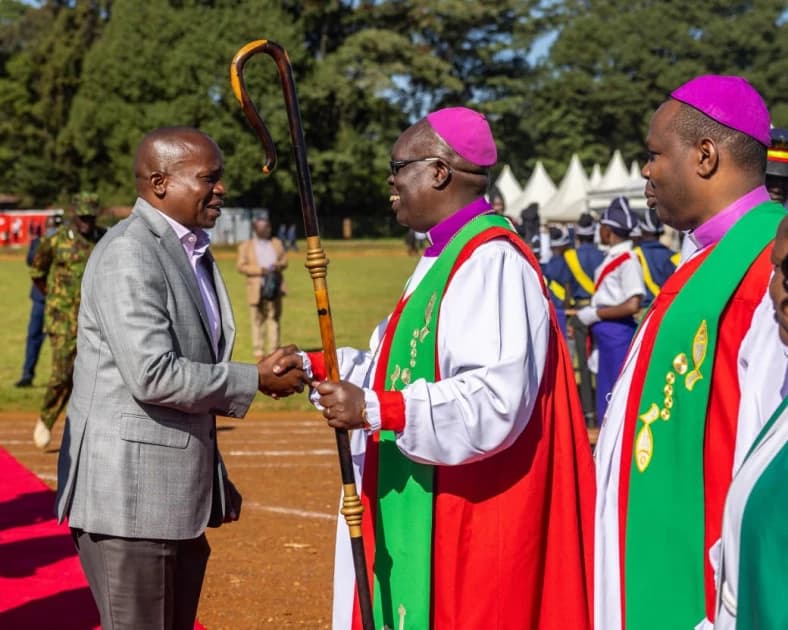We're loading the full news article for you. This includes the article content, images, author information, and related articles.
Deputy President Kithure Kindiki has vowed to ensure the complete execution of the government's development plan, a move aimed at addressing the high cost of living and spurring economic growth amidst ongoing public concern over new taxes and project delays.

Deputy President Kithure Kindiki has reaffirmed the government's commitment to fully implement President William Ruto's development agenda, emphasizing that his office is working tirelessly to oversee the execution of all presidential directives. Speaking in Nandi County on Sunday, November 16, 2025, Kindiki stated that the administration remains focused on its core mandate of uplifting the country and will not be distracted by political rhetoric.
“We remain focused on doing the right thing, building our country, accounting for our time in office, and supporting our president, who is the vision carrier of our country's unity,” Kindiki said, calling on leaders to support the president's efforts. As the President's principal assistant, his role involves coordinating with Cabinet Secretaries and Principal Secretaries to ensure development promises are fulfilled nationwide.
At the heart of the administration's strategy is the Bottom-Up Economic Transformation Agenda (BETA), a multi-pillar plan designed to stimulate growth from the grassroots. According to the National Treasury and Economic Planning, BETA's primary objectives are to lower the cost of living, create jobs, eradicate hunger, and achieve inclusive growth. The agenda is anchored on five key pillars:
The government has reported significant milestones in several BETA projects. The Hustler Fund, launched in November 2022, has disbursed nearly KSh 70 billion to over 25 million Kenyans as of May 2025, aiming to provide a lifeline for those excluded from formal credit markets. In agriculture, the fertilizer subsidy program has been a cornerstone policy, with the government securing 7.4 million bags for the 2025 long rains season at a subsidized price of KSh 2,500 per bag to boost food production.
The Affordable Housing Programme has also seen progress, with approximately 140,000 units completed or under construction by mid-2025. However, this initiative has faced significant challenges. Legal disputes, concerns over the mandatory Housing Levy, and uneven project rollout across counties have fueled public skepticism. Reports indicate that while some sites are advancing, others have stalled, and issues of transparency in allocation persist. Furthermore, a June 2025 report from the Controller of Budget revealed that only 52.8% of the KSh 88.7 billion collected from the levy had been utilized for housing projects, raising questions about fund management.
Kindiki's pledge comes at a time when many Kenyans are grappling with a high cost of living, a concern that has dominated public discourse. According to a January 2025 Afrobarometer survey, a majority of Kenyans feel the country is heading in the wrong direction, with 75% giving the government a poor rating on improving the living standards of the poor. While inflation has seen periods of decline, the Kenya National Bureau of Statistics (KNBS) reported a slight increase to 2.8% in November 2025, reversing a previous downward trend.
The opposition has consistently criticized the government's economic policies, arguing that new taxes, such as the increased VAT on fuel and the housing levy, have disproportionately burdened citizens. The Finance Bill 2025 has also drawn criticism for proposals to remove VAT exemptions on agricultural inputs, which farmer associations warn could neutralize the benefits of the fertilizer subsidy and further increase food production costs. In response, Kindiki has challenged the opposition to present a viable alternative development agenda rather than engaging in what he terms as “hateful, tribal and divisive” politics.
As the principal assistant to the President, the Deputy President's constitutional mandate includes chairing the Intergovernmental Budget and Economic Council (IBEC) and overseeing the implementation of Cabinet decisions, placing Kindiki at the center of the administration's efforts to deliver on its ambitious economic promises. His renewed commitment signals the executive's intent to accelerate these programs, even as it navigates economic pressures and a critical public eye.
Keep the conversation in one place—threads here stay linked to the story and in the forums.
Sign in to start a discussion
Start a conversation about this story and keep it linked here.
Other hot threads
E-sports and Gaming Community in Kenya
Active 9 months ago
The Role of Technology in Modern Agriculture (AgriTech)
Active 9 months ago
Popular Recreational Activities Across Counties
Active 9 months ago
Investing in Youth Sports Development Programs
Active 9 months ago